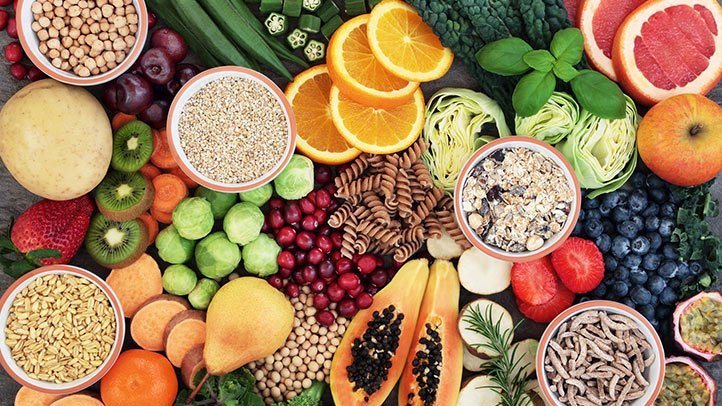In recent years, the organic food movement has gained significant traction, with more individuals than ever before opting for organically grown fruits, vegetables, and grains.
This shift is driven by a growing awareness of the health benefits associated with consuming organic products. Opting for organic foods not only supports sustainable farming practices but also ensures the consumption of products free from synthetic pesticides and fertilizers.

In this context, exploring the myriad health benefits of eating organic becomes crucial to understanding why making this choice can be a pivotal step towards a healthier lifestyle and overall well-being.
Reduced Exposure to Harmful Chemicals
Organic farming practices strictly prohibit the use of synthetic pesticides and fertilizers, leading to fruits, vegetables, and grains that are significantly lower in chemical residues. Studies have shown that consuming organic produce can reduce the body’s overall pesticide levels, thereby minimizing potential health risks associated with these chemicals, such as neurodevelopmental issues and certain cancers.
Organic foods are often richer in antioxidants and other nutrients, as the soil they grow in is managed through sustainable practices that enhance nutrient content. This means that organic produce can offer not only safer but potentially more nutritious options for consumers looking to optimize their health. From barn laid eggs to grass-fed dairy, organic animal products are also free from harmful hormones and antibiotics, making them a healthier choice for those looking to reduce their exposure to these chemicals. It’s important to note that while organic products may still contain small traces of synthetic chemicals, these levels are significantly lower compared to conventionally grown produce.
Enhanced Nutritional Content
Research indicates that organic crops frequently contain higher levels of antioxidants and certain micronutrients, including vitamin C, zinc, and iron. This increased nutritional content is attributed to the organic farming practices that improve soil quality and health, ultimately benefiting the nutritional value of the produce grown in it.
Aside from the nutritional benefits, organic farming techniques also contribute to better-tasting food. Many people report that organic fruits and vegetables have a more robust flavor compared to their conventionally grown counterparts. This could be due to the higher antioxidant content and the healthier soil conditions under which they are grown.

Cut Out Bad Habits
Another way in which you can live better, enhance your health and improve your lifestyle is by cutting out bad habits such as drinking, smoking and lack of exercise. Unfortunately, no amount of organic food or drink can help your body if you aren’t nourishing it well from all angles. If smoking is the habit you’d like to kick to the curb, then you can always look into alternative methods to help you relieve your cravings. You could try out meditation, visualizations or even give new zyn flavors 2024 a chance.
Everyone will have their own unique journey when it comes to quitting long-term habits such as smoking, so be sure to keep an open mind and explore as many options as possible. You should also be patient during the process too as it may take a while for your alternative methods to kick in. You won’t see any overnight results when it comes to addiction, so it’s important to play the long game and look for sustainable solutions so that your health benefits in the near and distant future.
Support for Sustainable Farming
Choosing organic not only impacts personal health but also supports environmentally sustainable farming methods. Organic agriculture reduces pollution and conserves water and soil quality, making it a more sustainable option for our planet. These practices also tend to be more conducive to biodiversity, promoting the health and balance of ecosystems.
By supporting organic farming, consumers help to endorse and expand the market for agriculture that avoids harmful pesticides and fertilizers. This, in turn, can lead to broader changes in the agricultural industry, encouraging more farms to adopt practices that are beneficial for both human health and the environment.
Improved Heart Health
One of the lesser-known benefits of eating Organic avocados, berries, apples, broccoli, beets, and tomatoes is their potential to support and improve heart health. Some organic products, particularly dairy and meat, may have a higher content of omega-3 fatty acids compared to products from animals raised by conventional farming methods. Omega-3 fatty acids are known to reduce the risk of heart disease by enhancing cardiovascular health.

This benefit is largely attributed to organic livestock farming practices, which require animals to spend more time grazing on grass. The resulting increase in omega-3 fatty acid levels in organic meat and dairy not only supports heart health but also provides a nutritional advantage over conventionally produced animal products.
Lower Risk of Antibiotic Resistance
Organic farming standards prohibit the use of antibiotics in healthy animals, a practice that is otherwise common in conventional agriculture to promote growth and prevent disease. This significant difference means that consuming organic meat and dairy products can help reduce the risk of antibiotic resistance, a growing public health concern globally.
By avoiding products from animals treated with antibiotics, consumers can play a part in combatting the spread of antibiotic-resistant bacteria. This not only contributes to individual health but also aids in the larger battle against antibiotic resistance, ensuring that these life-saving medicines remain effective for future generations.
Economic Benefits of Choosing Organic
The economic advantages of opting for organic products extend beyond personal health benefits to influence the broader economic landscape. By choosing organic, consumers directly support small and local farmers who are more likely to employ sustainable practices compared to large, conventional agricultural operations. This support helps to sustain and grow local economies, creating jobs and ensuring that money stays within the community. Additionally, as demand for organic products increases, it encourages more farmers to transition to organic farming, leading to a healthier agricultural sector that prioritizes long-term sustainability over immediate yields.

Investing in organic foods can also be seen as a long-term savings plan for healthcare costs. By consuming foods that are less likely to be contaminated with pesticides and other harmful chemicals, individuals may reduce their risk of chronic diseases and health issues, potentially lowering their medical expenses over time. Furthermore, supporting organic agriculture can lead to a decrease in environmental cleanup costs that result from conventional farming practices, which often necessitate expensive remediation efforts to address water and soil pollution.
Environmental Impact of Organic Farming
Organic farming practices offer significant environmental benefits by maintaining ecological balance and conserving biodiversity. Unlike conventional farming, which can degrade and deplete soil, organic farming maintains healthy soils through crop rotations, cover crops, and the use of compost. This not only prevents soil erosion but also improves soil fertility, enabling it to store more carbon and reduce greenhouse gas emissions.
The reduction of chemical runoff is another critical environmental benefit of organic farming. Synthetic pesticides and fertilizers used in conventional farming often leach into water bodies, harming aquatic life and contaminating drinking water supplies. Organic farming’s prohibition of these chemicals greatly minimizes water pollution, safeguarding aquatic ecosystems and protecting public health.
Consumer Trends and Organic Foods
The consumer shift towards organic foods reflects a growing awareness and preference for healthier, more sustainable lifestyle choices. This trend is increasingly evident in the rise of organic food sales, which have consistently grown year over year. Consumers are becoming more conscientious about the environmental impact of their purchasing decisions and are willing to pay a premium for products that promise to be better for their health and the planet.
The transparency in organic food production also resonates with modern consumers who seek to understand where their food comes from and how it is produced. Organic certifications offer a level of trust and assurance that the foods they are buying are free from synthetic pesticides and genetically modified organisms (GMOs), aligning with their values for natural and wholesome nutrition.
The health benefits of consuming organic foods extend beyond personal well-being to encompass environmental and economic sustainability. By choosing organic, individuals can make a positive impact on their own health while supporting more sustainable farming practices and contributing to a cleaner, healthier planet for future generations.






